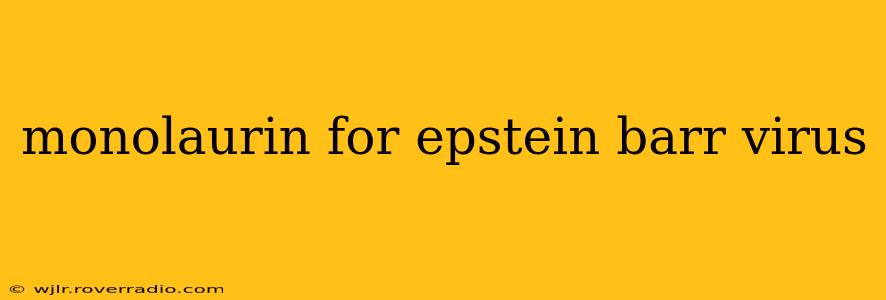Epstein-Barr virus (EBV), a common herpes virus, infects the majority of adults worldwide. While often asymptomatic, EBV can cause infectious mononucleosis ("mono") and has been linked to several chronic illnesses. Many individuals search for natural ways to manage EBV symptoms and potentially support the immune system's response to the virus. Monolaurin, a monoglyceride derived from lauric acid found in coconut oil, has gained attention for its purported antiviral properties. This article explores the current research on monolaurin's potential efficacy against EBV and addresses common questions surrounding its use.
What is Monolaurin and How Does it Work?
Monolaurin is a naturally occurring compound found in coconut oil. It's a monoglyceride of lauric acid, meaning it's a fatty acid with a single glycerol molecule attached. Lauric acid itself possesses antimicrobial properties, and it's believed that monolaurin's effectiveness stems from its ability to disrupt the lipid membranes of viruses, bacteria, and some fungi. This disruption essentially compromises the integrity of the pathogen, making it unable to reproduce or infect cells. However, it's crucial to understand that this mechanism is not unique to monolaurin; many other fatty acids exhibit similar activity.
Does Monolaurin Kill the Epstein-Barr Virus?
This is a crucial question with a nuanced answer. While in vitro (lab) studies have demonstrated that monolaurin shows antiviral activity against some enveloped viruses, including certain herpes viruses, there is currently no robust clinical evidence proving its effectiveness against Epstein-Barr virus in humans. The in vitro studies provide a promising foundation, suggesting a potential mechanism of action. However, these results don't automatically translate to human efficacy. Further clinical trials are needed to confirm whether monolaurin can effectively combat EBV in individuals.
Can Monolaurin Help with Epstein-Barr Virus Symptoms?
Some people report experiencing a reduction in EBV-related symptoms after using monolaurin. These anecdotal reports often describe improvements in fatigue, brain fog, and other common complaints. However, it's important to remember that correlation doesn't equal causation. These improvements could be due to other factors, such as lifestyle changes, stress reduction, or the natural course of the illness. Until well-designed clinical trials validate these anecdotal observations, it's premature to claim that monolaurin directly alleviates EBV symptoms.
What are the Side Effects of Monolaurin?
Generally, monolaurin is considered safe for consumption when taken in moderate amounts. However, some individuals may experience mild side effects such as digestive upset (diarrhea, nausea) if they consume large doses. Individuals with known allergies to coconut or its components should exercise caution. As with any supplement, it's advisable to consult a healthcare professional before incorporating monolaurin into your routine, especially if you have pre-existing health conditions or are taking other medications.
Is Monolaurin a Cure for Epstein-Barr Virus?
No, monolaurin is not a cure for Epstein-Barr virus. There is no known cure for EBV. The virus establishes latency in the body, meaning it can remain dormant for extended periods. While treatments exist to manage acute symptoms of infectious mononucleosis, there's no proven method to completely eliminate EBV from the system. Monolaurin, based on current research, does not qualify as a cure.
How Can I Support My Immune System When Dealing with EBV?
Supporting your immune system is a crucial aspect of managing EBV and mitigating symptoms. This involves a holistic approach encompassing:
- Adequate Sleep: Prioritize 7-9 hours of quality sleep per night.
- Stress Management: Practice relaxation techniques like yoga, meditation, or deep breathing.
- Balanced Nutrition: Focus on a diet rich in fruits, vegetables, and whole grains.
- Regular Exercise: Engage in moderate-intensity exercise most days of the week.
- Hydration: Drink plenty of water throughout the day.
Disclaimer: This information is for educational purposes only and should not be considered medical advice. Always consult with a qualified healthcare professional before making any decisions related to your health or treatment. The information provided here does not endorse or recommend the use of monolaurin for EBV treatment without proper medical guidance.
